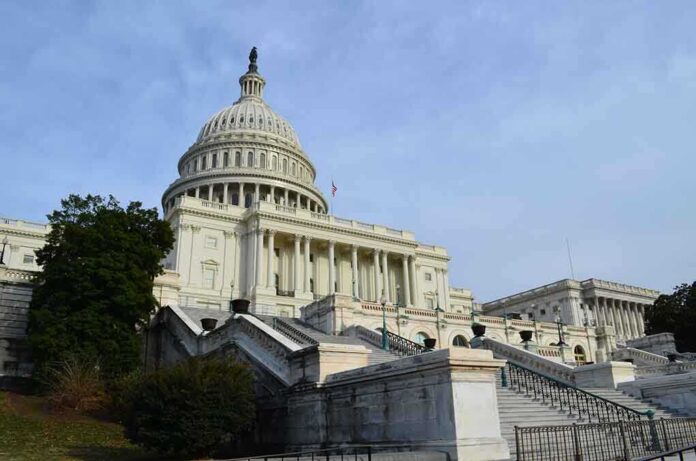
Senate Republicans and Democrats clash over the GENIUS Act as concerns over cryptocurrency regulation and financial safeguards threaten to derail the stablecoin legislation before Thursday’s crucial vote.
Key Takeaways
- Nine Senate Democrats have withdrawn their support for the GENIUS Act, citing insufficient protections against money laundering and national security threats.
- Republicans need at least seven Democratic votes to advance the stablecoin legislation that would create a federal regulatory framework.
- Senate Majority Leader John Thune has signaled openness to Democratic amendments to salvage the bill.
- The bill would allow nonbank stablecoin issuers to operate in the U.S. with a requirement to hold 1:1 reserves in high-quality liquid assets.
- Democrats have raised concerns about recent crypto ventures by President Trump and a UAE-backed investment deal.
Bipartisan Support Collapses as Vote Approaches
The Senate’s plan to vote on the GENIUS Act has been thrown into uncertainty after nine Democratic senators formally withdrew their support for the bill. The legislation, which would create the first comprehensive federal framework for regulating stablecoins, initially had bipartisan backing but now faces significant opposition from key Democrats who argue the protections in the bill are inadequate.
Senate Majority Leader John Thune acknowledged the growing resistance but indicated Republicans remain open to compromise. “Changes can be made on the floor for sure,” Thune said, adding that he’s “waiting to see what it is Democrats are asking for.”
U.S. STABLECOIN BILL FACES DEMOCRATIC REVERSAL
Nine Senate Democrats have pulled support from the bipartisan GENIUS Act, citing national security, AML, and consumer protection concerns.
This surprise move threatens the bill’s progress and may delay stablecoin regulations.… pic.twitter.com/ACNUhIIyuO
— Crypto Town Hall (@Crypto_TownHall) May 4, 2025
The GENIUS Act (Guiding and Establishing National Innovation for U.S. Stablecoins Act) addresses a significant regulatory gap for stablecoins, which have grown to over $240 billion in market capitalization. Republicans need at least 60 votes, including support from seven Democrats, to advance the legislation in the evenly divided Senate.
Critical Security and Financial Concerns
Democratic senators outlined specific concerns in a joint statement, focusing on inadequate anti-money laundering provisions, oversight of foreign issuers, national security implications, and financial system stability. Senators who withdrew support include Mark Warner, Lisa Blunt Rochester, Andy Kim, and Ruben Gallego, creating a substantial hurdle for the bill’s passage.
Thune has expressed frustration with the opposition, claiming the current version is the sixth iteration of the bill that has been modified repeatedly based on Democratic feedback. “This is the sixth version of the bill … they’ve modified it each time based on feedback they’ve gotten, largely from Democrats,” he argued.
Trump Connection Intensifies Scrutiny
The controversy has intensified following recent cryptocurrency ventures by President Trump and his family. Senator Elizabeth Warren specifically cited concerns about a stablecoin deal involving a UAE-backed firm, suggesting potential conflicts of interest that warrant greater regulatory oversight.
If passed, the GENIUS Act would require stablecoin issuers to maintain liquid reserves equal to their outstanding tokens, providing consumer protections while allowing nonbank entities to participate in the market. Stablecoins are digital currencies pegged to fixed assets like the U.S. dollar, designed to offer predictability for everyday transactions in the volatile cryptocurrency space.
Industry Stakes and Path Forward
The cryptocurrency industry strongly supports the legislation, emphasizing that a clear regulatory framework would enhance stablecoin adoption and strengthen U.S. dollar dominance in the digital economy. Senator Bill Hagerty, a Republican sponsor, warned against letting “partisan games derail the momentum” on the bill.
With the vote scheduled for Thursday, Republican leadership faces the challenge of either winning back Democratic support through substantial amendments or potentially delaying the vote. The bill represents a significant opportunity to establish nationwide standards for stablecoins, which currently operate under inconsistent state regulations, but the growing partisan divide may prove difficult to bridge on such short notice.
Sources:
Thune Signals GOP Willing to Compromise on Stablecoin Bill as Senate Vote Nears
Stablecoins bill faces hurdle after Democrats withdraw support
Senate eyes vote on stablecoin bill despite Democratic revolt


 News Editor
News Editor




























